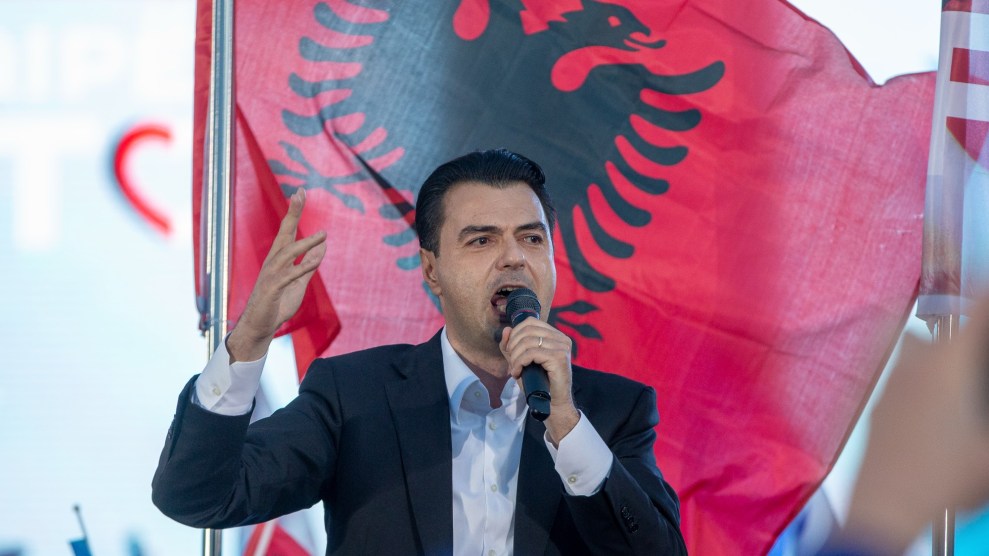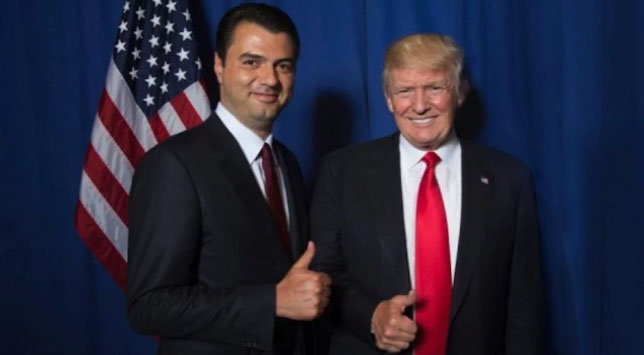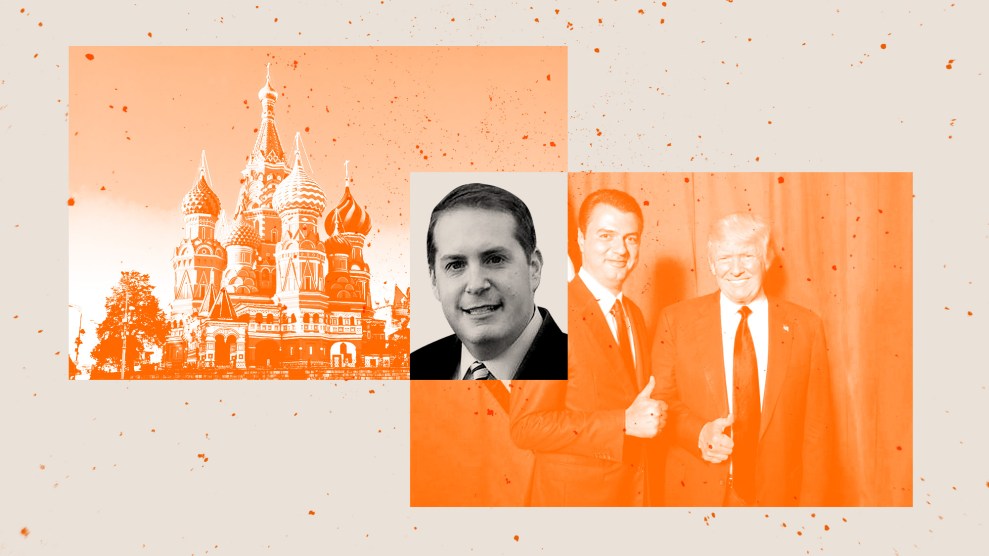
Joe Minchillo/AP
It was shocking news: Charles McGonigal, a former counterintelligence chief for the FBI, was arrested for his alleged role in two separate schemes. In one, he purportedly accepted $225,000 from an Albanian American businessman, while he was still in the FBI, and did favors for that businessman and Albanian Prime Minister Edi Rama. In the other, McGonigal, after he retired in 2018, allegedly provided investigative services to Russian oligarch Oleg Deripaska, who was sanctioned in 2018 for assisting the global “malign” activities of Putin’s regime. McGonigal’s indictments raise a boatload of questions and has spurred the bureau to scrutinize his actions when he was in charge of monitoring and thwarting the intelligence efforts of foreign powers (including Russia) aimed at the United States. In spy-movie parlance, the FBI will want to know when did he go bad (presuming he did go bad).
The McGonigal case also has cast attention on one of the more bizarre foreign influence operations to occur in Washington, DC, in recent years—a little-known and underreported Russia-linked effort to influence American politics about Albania.
The tale of this influence operation is a complicated one that Mother Jones revealed in 2018. The main disclosure was that a mysterious shell company registered in Scotland called Biniatta Trade—which was created by two Belize companies that were partly controlled by two British companies that were each controlled by a different Russian national—paid $150,000 in early 2017 to a Washington lobbyist named Nick Muzin to promote in the United States the Democratic Party of Albania, the conservative party opposed to Rama’s government.
Muzin, who had worked on Trump’s winning presidential campaign, used his influence to gather support within the Republican Party and the US conservative movement for Lulzim Basha, the DPA leader, who was campaigning for prime minister. Muzin set up a visit to Washington for Basha that included meetings with GOP House members. Basha attended the National Republican Congressional Committee’s annual dinner, which featured Trump as the speaker. Muzin contacted Steve Bannon, then a top White House adviser, and other White House officials on Basha’s behalf. He arranged for Basha to be interviewed by Breitbart News.
The aim was to round up backing in the United States for Basha, who was running in Albania as a populist nationalist and Trump fan and pushing the slogan “Make Albania Great Again.” As an ardent foe of Rama, a pro-West critic of Putin who had warned about Russia’s attempt to gain influence in the Balkans, Basha, presumably, was the Kremlin’s preferred candidate.
At one point, Muzin brought Basha to a GOP fundraiser in Wisconsin where Trump was the main speaker. At this event—where a $20,000 donation earned an attendee a VIP seat and a photograph with Trump—Basha had his photo snapped with Trump. In Albania, the DPA widely disseminated the picture, and Basha claimed he’d had an “extraordinary meeting” with Trump.
The Trump connection that Muzin helped Basha forge did not win the day for the Albanian. In the Albanian election that year, Rama’s Socialist Party picked up seats and won a full majority of the parliament.
In some ways, Muzin’s work for Basha and the DPA was not unusual. Foreign politicians and political parties often retain American lobbyists in the pursuit of support and influence in the United States. What was odd was that Biniatta Trade picked up much of the tab for Muzin’s toils.
There were no public signs this company was engaged in any commerce. It had a phony looking, generic website that was linked to similar websites for other companies that had no public footprints. (The Biniatta Trade website is no longer functioning.) The company shared a British phone number with an “international online dating service” that offered “beautiful Ukrainian women for dating and marriage.”
The only information on Biniatta Trade we could find was a paper trail of other shell companies that eventually traced back to two Russians who had controlled defunct enterprises and who could not be reached. A Russia-linked shell company is not the usual source of funding for American lobbying efforts, and this uncommon arrangement suggested that some Russian entity was trying to influence US politics to benefit Basha and the DPA.
A spokesman for Muzin told Mother Jones at that time that Muzin believed Biniatta Trade was a private company owned by supporters of the Democratic Party of Albania. Muzin declined to explain how he had first come into contact with Biniatta Trade.
Last fall, a US intelligence finding noted that Russia had spent about $300 million since 2014 to influence politics in other countries to its favor. An administration source told the AFP that this included spending “around $500,000 to back Albania’s center-right Democratic Party in 2017 elections.”
How does all this connect to McGonigal? The Justice Department indictment alleges that in or by August 2017 McGonigal struck up a business relationship with “Person A,” a naturalized US citizen who had been born in Albania and who had worked for an Albanian intelligence service decades earlier. Albanian news reports have identified this person as Agron Neza, a New Jersey businessman. In a letter to Albanian outlets, Neza admitted giving McGonigal money and called Rama an “acquaintance,” but he said he handed the funds to McGonigal for personal reasons.
According to the indictment, McGonigal and Neza made several trips together to Albania, where McGonigal met with Rama, the prime minister, and “Person B,” who, according to the New York Times, was Dorian Ducka, a former Albanian official and an informal adviser to Rama.
Neza allegedly paid McGonigal $225,000 in the fall of 2017, in three installments, including one in which Neza passed the FBI man $80,000 in cash in a car parked outside a New York City restaurant.
After McGonigal had met a second time with Rama, Ducka, according to the indictment, passed information to McGonigal about a “a U.S. citizen who had registered to perform lobbying work in the United States on behalf of an Albanian political party different from the one in which the Prime Minister was a member.” McGonigal conveyed this information to a Justice Department prosecutor for possible criminal investigation. He subsequently received more information about the lobbyist from Neza and Rama and transmitted the material to FBI investigators.
On February 26, 2018, the indictment reads, “the FBI-NY formally opened a criminal investigation focused on the U.S. citizen lobbyist at defendant McGonigal’s request and upon his guidance.” Neza and Ducka later provided assistance to the inquiry. McGonigal, according to the Justice Department “had not at any time disclosed [to the FBI] his financial relationship with Person A [Neza] to the FBI, nor had defendant McGonigal disclosed his ongoing contacts with Person B [Ducka] as required.”
The timing of events described in the indictment indicate Muzin was the lobbyist McGonigal was targeting. As the New York Times has reported, “The events detailed in the indictment and other public records seem to match the description of the lobbyist Nicolas D. Muzin.”
It’s uncertain how far any FBI investigation of Muzin proceeded. No charges were ever brought against him. Muzin told the Times in a statement that he had “no reason to believe that I was the victim of this false investigation. But if I was, that is unfortunate, and I hope that justice will be served.” Muzin did not respond to numerous requests for comment from Mother Jones.
The Mother Jones report in 2018 sparked front-page stories in Albanian newspapers. The following year, Albanian prosecutors charged Basha with money laundering and falsifying documents in connection to the Biniatta Trade matter. Basha denied accepting Russian money. The case was later suspended under murky circumstances. His party has insisted it paid Muzin only $25,000, offering no explanation of why another entity (that is, Biniatta Trade) would pay a US lobbyist a hefty amount to help the DPA.
In the 2021 Albanian parliamentary elections, Rama led his party to another victory over Basha’s DPA and earned a third term as prime minister. Basha left the DPA a year ago and was replaced by the party’s founder, Sali Berisha, who is barred from entering the United States due to what the State Department says is his “involvement in significant corruption.”
There remain plenty of questions about this episode. Why was the Albanian government so worried about the pro-DPA lobbying effort? What information did it pass to McGonigal? Did it involve the funding that went to Muzin? Did the FBI fully investigate Muzin? Did that inquiry include tracing the origins of the money that underwrote his lobbying? There still has been no explanation of why a mysterious Russia-linked shell company paid for a Republican lobbyist to use his clout with the GOP and conservatives to assist a right-wing Albanian political party.
The intersection of McGonigal’s tale and that of the financing of Muzin’s lobbying by Biniatta Trade makes two mysterious stories even more so. A US lobbyist received money tied to Russia to help a political party in a small Balkan nation. And an allegedly crooked FBI agent was involved in investigating that lobbyist, seemingly at the behest of a rival Albanian party. Albania, like Russia, is famously corrupt, wracked with allegations that many officials, including judges and prosectors, are on the take. The merged sagas of Biniatta Trade and Charles McGonigal show how easily that corruption infiltrated the United States.



















